Best of the Phoenix Helix Podcast
Many of you know that July was an intense month for me. I’ve been taking time to focus on my health and my family. That means that I’m taking a short break from recording new podcast episodes and sharing favorites from the archives that you might have missed. This episode tops that list! At its basic level, food is sustenance. It fuels us for life. But food is more than just a source of energy. Emotions surround the experience of eating as well. Food can comfort and bring joy, yet it can also inspire feelings of guilt. People also connect with each other over food, building memories, traditions, and even identities. And when you’re following a healing diet, there’s gratitude for food being medicine, often combined with feelings of deprivation, rebellion and grief. It’s complex! Here’s the fascinating part you might not realize: Not only does food inspire emotion, but emotions impact our ability to digest our food, including how well we tolerate foods. My guest today is an expert on this topic. Marc David is the founder of the Institute for the Psychology of Eating. He’s also the author of two books: Nourishing Wisdom – A Mind-Body Approach to Nutrition and Wellbeing, and The Slow Down Diet. Today, we’ll be exploring in depth the intersection of the mind and body when it comes to the food we eat and how it impacts our health.
Listen to the Show
- Subscribe to my podcast through your favorite podcast app: iTunes, Stitcher, Google, TuneIn, Spotify, Amazon, etc.
- You can also listen to the episode right here through the player below, and if you subscribe to my newsletter you’ll get notified of future episodes.
Podcast: Play in new window | Download
Show Notes
- Intro (0:00)
- Meet Marc David (3:28)
- His interest in nutrition and health began very early in his childhood. He was in and out of doctor’s offices with frequent illness and severe asthma. At age 5, he heard that fruits and vegetables were supposed to be good for you, so he asked his mother to start including them in his meals. (He had been raised on processed foods up until that point.) When his health improved a little bit, he was hooked on the idea that food can be medicine.
- He studied nutrition in college, but when he started working with clients, he learned that information wasn’t enough to help people make lasting healthy changes in their lives. He went back to school to get a master’s degree in psychology, but there were no classes on the psychology of eating. After years of independent research, he founded The Institute for the Psychology of Eating, to teach others what he learned.
- What Is Mind-Body Nutrition? (7:15)
- Our emotions, thoughts, and beliefs all impact how our body absorbs and metabolizes food.
- What we’re eating is half the story when it comes to nutrition. The other half is who we are as eaters.
- Resource: 4 Ways Stress Impacts Digestion
- Why Does Food Intolerance Sometimes Improve During Vacations? (10:36)
- Our nervous system has 2 branches. The sympathetic nervous system is known as the “fight or flight” response. The parasympathetic nervous system is known as the “rest and digest” response. All healing happens when in a parasympathetic state. This is why we rest so much when we’re sick. Stress activates the sympathetic nervous system, so it’s often dominant in modern life. On vacations, the parasympathetic takes over, and we not only digest our food better, but our autoimmune activity often decreases as well.
- How Can We Tap Into this Vacation Benefit In Daily Life? (15:36)
- Ask yourself this question: “Do I tend to eat under stress, or do I tend to eat under relaxation?”
- Ways that we eat under stress (which negatively impact our digestion): Trying to multi-task while we eat. Eating quickly. Background stress that we carry with us throughout the day.
- Ways to bring relaxation to the meal experience: Take 5-10 slow, deep breaths before a meal. Focus on eating without doing anything else. Eat slowly.
- Reflect on the bigger picture: where is the self-chosen stress in our lives that we can start to let go: perfectionism, self-judgment, harsh self-criticism, etc. All of these are emotional autoimmune attacks (attacks on self).
- Resource Articles:
- Where to Begin When It Comes to Self-Love vs. Self-Judgment (22:14)
- First, understand that the mind-body connection affects our health, whether consciously or unconsciously.
- Personal power = metabolic power. Reaching our personal potential helps our body reach its physical potential. So, personal growth is an essential part of physical healing.
- Be willing to get curious and ask yourself the deeper questions: Why am I here? What lessons am I here to learn? How am I here to grow? What character flaws am I here to overcome? How am I able to serve others? Where am I falling short? Where am I excelling? Ask these questions with love, not self-judgment. This is a lifelong pursuit – not something that happens overnight. But the journey begins with asking these questions.
- Addressing the special challenge of autoimmune disease: feeling betrayed by and at war with our bodies. It’s natural to feel angry, disappointed and depressed when we are struggling with severe symptoms, but we need to have a deeper understanding that our bodies want to help us. Feeling at war with our bodies compounds the problem by activating the “fight or flight” response – which is the opposite of a healing state. We need to have compassion with ourselves for having these human feelings, but we need to strive to transcend them and love our bodies instead. Relaxing into our symptoms – though counter-intuitive – can activate healing.
- Resources:
- Thank You to Our Podcast Sponsor – Paleo on the Go (38:00)
- A frozen meal delivery service, 100% of their menu is compliant with the elimination phase of the paleo autoimmune protocol (AIP). They have over 5o items, including entrees, side dishes, broth, AIP-friendly bacon, and desserts.
- Use the code PHOENIX for 10% off your first order.
- 3 Kinds of Food Cravings (39:42)
- Supportive Cravings: Your body is craving something it needs – an example of the body’s wisdom.
- Dispersive Cravings: Your body is craving something harmful – usually born from a distorted yearning to fill a hole in our lives.
- Associative Cravings: The craving is associated with a powerful memory.
- Resource article:
- When “Comfort Food” Hurts (46:23)
- When we struggle to stop eating the foods that increase our autoimmune symptoms.
- The first step is to remove the “battle” mindset. This isn’t a habit to “break”; it’s one to be understood. Approach it with compassion for ourselves and an understanding that this is a difficult challenge to face.
- The answer is simple, but not easy. It takes practice, and it’s not something people succeed at overnight. But with time and effort, this challenge can be transformed.
- Resources:
- Fear of Food – Walking That Line Between a Healing Diet and Disordered Eating (55:43)
- Being mindful of food choices and being afraid are two different things. Fear is a stress response that will inhibit digestion and increase food intolerance. So, it can become a vicious cycle. Develop an awareness of when fear enters the picture and catch yourself; don’t let it snowball.
- A healing diet requires nutrient-dense food choices. It’s not just about avoiding inflammatory foods.
- A healing lifestyle is also about far more than just food.
- Resources:
- Outro (1:02:07)
- Marc David’s books are: Nourishing Wisdom – A Mind-Body Approach to Nutrition and Wellbeing, and The Slow Down Diet. His website is full of information as well, including videos, articles, educational programs and a practitioner directory. He also has a great podcast called The Psychology of Eating.
- Eileen (your podcast host) is the author of multiple books, written to help people thrive with autoimmune disease. Learn more on the Books Page.
- If you like this podcast, follow or subscribe through your favorite podcast app. You can also subscribe to Eileen’s biweekly newsletter.
- Check out the entire archive of podcast episodes.
You May Also Be Interested In
with Jeff Warren
with Dr. Vickie Bhatia
Spreading the Word
If you like the podcast, please leave a positive review in iTunes. It would mean the world to me, and also helps others find the podcast. Here are some quick instructions using your iPhone:
- If you are already subscribed to my podcast: (1) Click the purple podcast icon. (2) At the bottom of the screen, click Library. (3) At the top of the screen, click Shows. (4) Click the Phoenix Helix podcast image. (5) Scroll down the page, and you’ll see Ratings and Reviews. Scroll down a little bit more and click on Write a Review. This will bring up the review screen. Tap 5 stars (if you love the podcast), and then click in the title box, and it will bring up the keyboard. Enter a title and short review. (6) Click Send in the upper right corner. (7) Thank you! Positive reviews give the podcast a higher search ranking in iTunes, helping people find it and letting them know it’s a quality podcast and worth their time to listen.
- If you haven’t subscribed to my podcast: (1) Click the purple podcast icon. (2) In the lower right corner, click the magnifying class. (3) Type Phoenix Helix in the search box. (4) Click the podcast cover in the Show list. (5) If you’d like to subscribe, click the + sign at the top of the screen. (6) To write a review, scroll down the page, and you’ll see Ratings and Reviews. Scroll down a little bit more and click on Write a Review. This will bring up the review screen. Tap 5 stars (if you love the podcast), and then click in the title box, and it will bring up the keyboard. Enter a title and short review. (7) Click Send in the upper right corner. (8) Thank you! Positive reviews give the podcast a higher search ranking in iTunes, helping people find it and letting them know it’s a quality podcast and worth their time to listen.

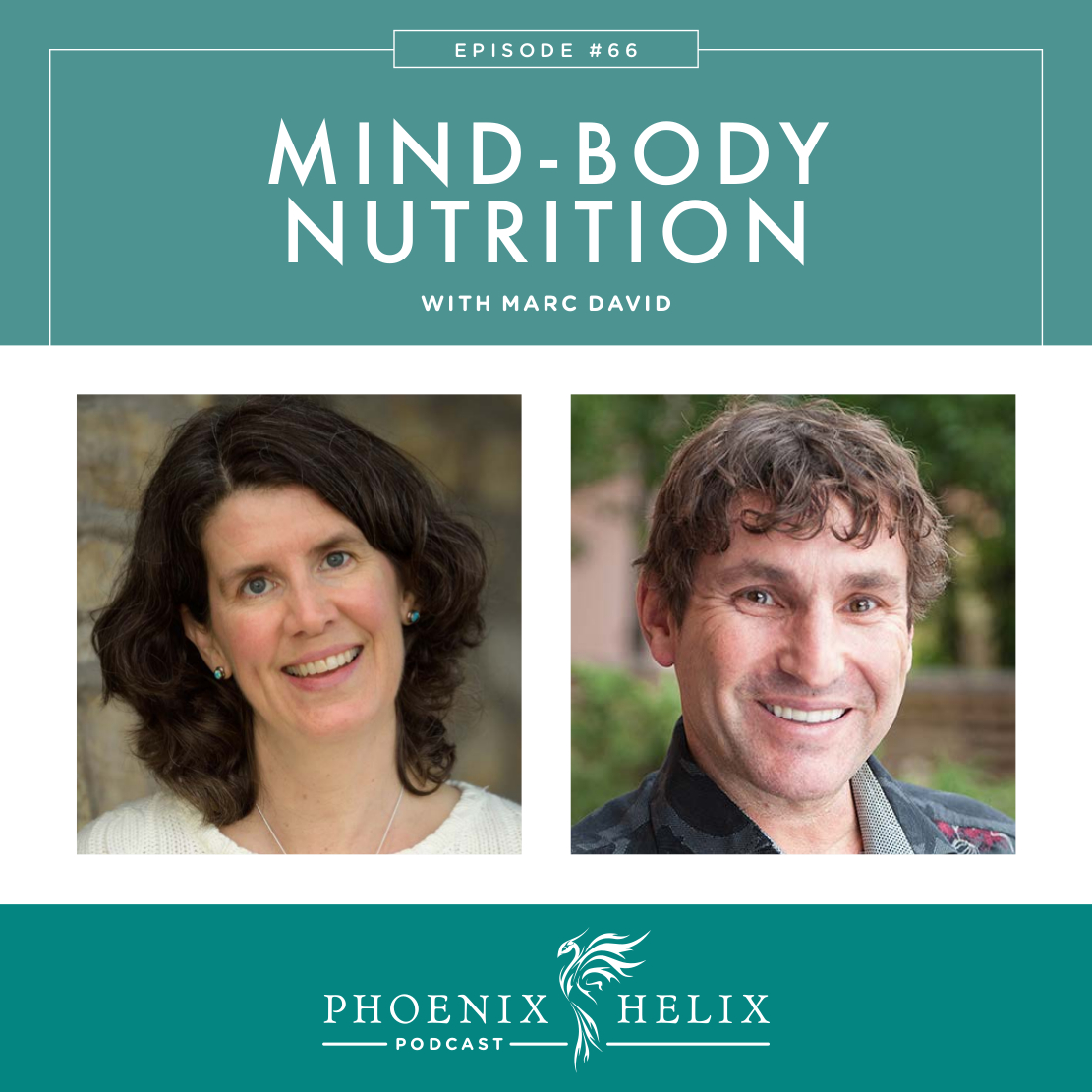
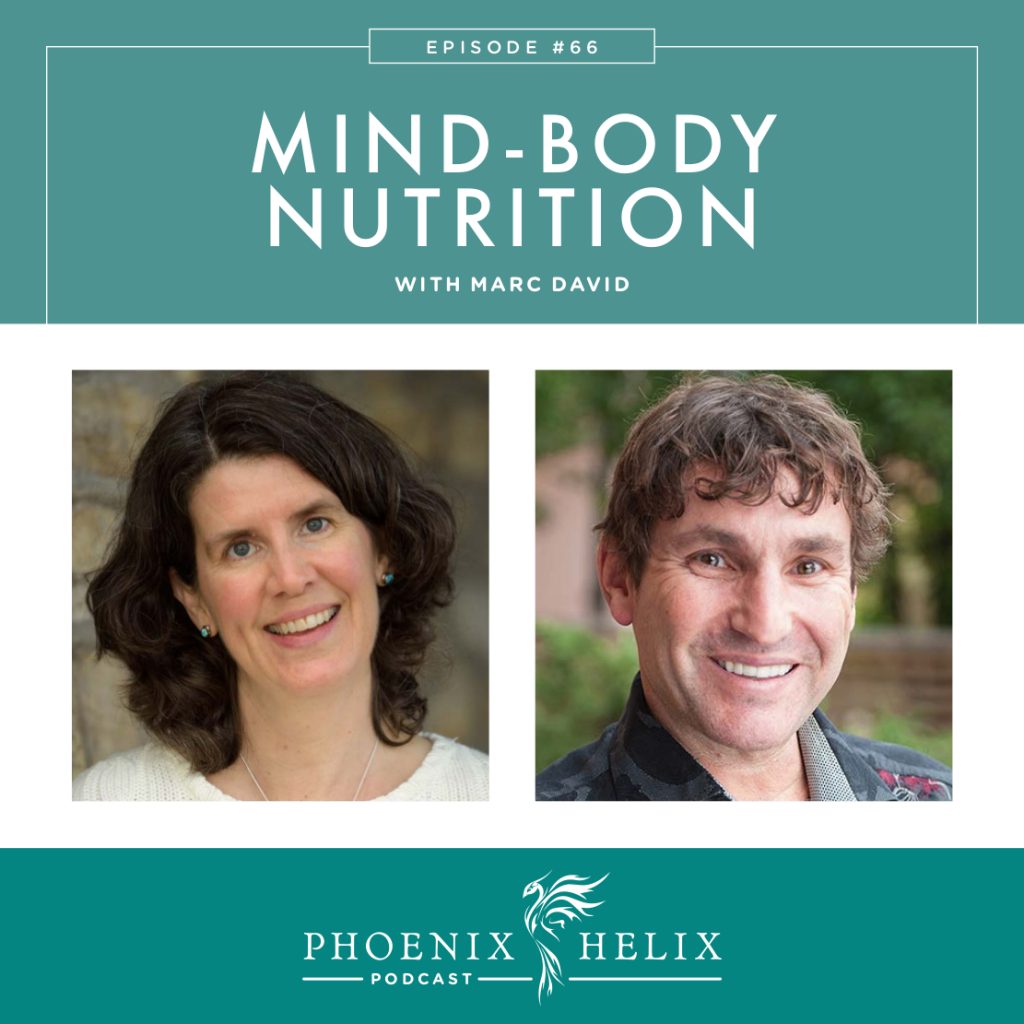
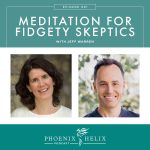

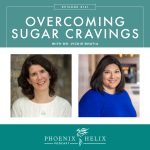

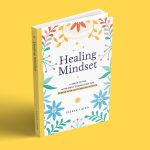


I love the topic and information of this show. Part of the AIP lifestyle is the mind and we often talk about the importance of meditation, faith or spirituality and positive thought. I don’t think I’ve heard many people talk about the direct link to eating and how stress and negative self talk affect how we metabolize our food. Marc David does this so well and he’s encouraging to listen to, giving us reasonable explanations and tools to help us.
I too add my condolences for the loss of your father. When I lost each of my parents, both times it was difficult for me. You were one of the first sites I found when I discovered AIP. Thank you for all your hard work.
Hugs,
Leslie
Leslie, I’m so glad you loved this episode as much as I did! And thank you so much for your kind and thoughtful words. While this has been a challenging summer, I’ve received so much love and support. I’m very grateful.
Hi Eileen,
July was a huge transition month. Condolences to you and your family in the passing of your father. It’s good to hear that you are taking care of yourself and making time for you.
Thxx for your e-book on reintroducing food on AIP. Your nightshade-free curry blend is the best I’ve found!
All the best to you…
I’m glad to hear you love that curry blend. I love it, too! And thank you for you kind words on the loss of my father. Everyone’s been so supportive, and I truly appreciate it.